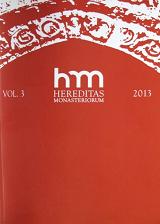Sources for the history of mendicant economy in Royal Prussia from the 15th till the beginning of the 16th century
Sources for the history of mendicant economy in Royal Prussia from the 15th till the beginning of the 16th century
Author(s): Rafał KubickiSubject(s): History
Published by: Laboratoire de Recherches sur l'Histoire des Congregations et Ordres Religieux (LARHCOR)
Keywords: mendicant orders; friars; Dominicans; Franciscans; Franciscan Observants; Austin Hermits; Carmelites; economy of mendicant convents; testaments; State of the Teutonic Order; Royal Prussia; Gdańsk; Pomerania; Elbląg
Summary/Abstract: The article presents the results of a preliminary research on the sources for the history of the mendicant economy as exemplified by monasteries from the state of the Order of Teutonic Knights in Prussia, with special emphasis on the territories which after 1466 were incorporated to Poland as the so-called Royal Prussia, and which were composed mainly of the lands of Pomeralia (Gdańsk Pomerania), taken control of by the Order after 1308. The lands of the Order in Prussia, and later the Royal and Teutonic Prussia, hosted convents of four mendicant orders: the Dominicans, the Franciscans and the Franciscan Observants, the Austin Hermits, and the Carmelites. The documentation concerning the monasteries in question has been preserved to a various degree. These sources are currently dispersed in several state (Gdańsk, Toruń) and Church (diocesan archives in Peplin and Olsztyn) archives, as well as the former archive of the Teutonic Order, which is currently kept at Dahlem (Berlin). Most of them have been taken over from the archives of abandoned monasteries in the 16th century (the Gdańsk and Toruń archives) and during the 19th century monastery dissolutions (the Peplin archive). The remaining part of the documentation are records produced and kept at municipal archives in towns where mendicant orders were present. All these sources offer an insight into the income structure of mendicant orders from these territories. What makes research difficult, however, is the lack of bookkeping records. Proper estimation of sources can be achieved only when they are studied in a complex way, including both the monastery sources and the municipal records. Only by making use of the entire content which the latter offer might we obtain a reliable picture of the economic situation and the social role played by mendicants in urban centres.
Journal: Hereditas Monasteriorum
- Issue Year: 2013
- Issue No: 3
- Page Range: 55-65
- Page Count: 11
- Language: English

